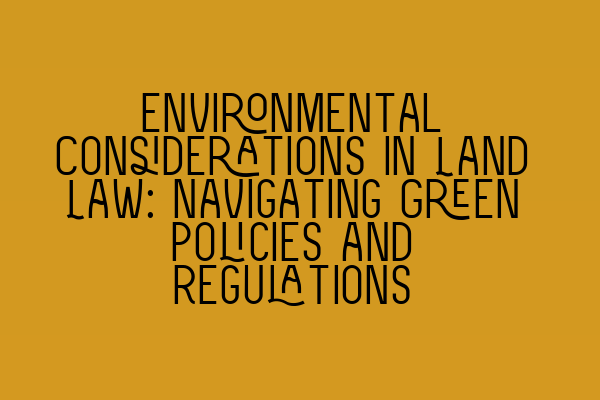Environmental Considerations in Land Law: Navigating Green Policies and Regulations
In today’s world, environmental concerns have become increasingly important in all areas of life, and land law is no exception. As a solicitor practicing property law, it is crucial to have a firm understanding of the various environmental considerations that can arise when dealing with land transactions and property development.
With the ever-growing focus on sustainability and preservation of our natural resources, both individuals and organizations are now required to comply with a wide range of green policies and regulations. This blog post aims to shed light on some of the key environmental considerations that should be taken into account in land law, helping solicitors and property professionals navigate this complex landscape.
1. Environmental Impact Assessments (EIA)
When it comes to land development projects, an important green policy to consider is the requirement for an Environmental Impact Assessment (EIA). An EIA is a detailed assessment of the potential environmental effects of a proposed development.
By understanding the potential environmental impacts of a project, solicitors can advise their clients on how to minimize any adverse effects and ensure compliance with relevant regulations. It is crucial to engage with expert environmental consultants who can conduct a thorough assessment and provide guidance on managing potential environmental risks.
For more information on the importance of EIA in land development projects, check out our related article: SQE 1 Practice Exam Questions.
2. Contaminated Land
In many land transactions, the presence of contamination can be a significant concern. Contaminated land refers to land that has been polluted by hazardous substances, posing potential risks to human health and the environment.
As a solicitor dealing with land transactions, it is essential to investigate and identify any potential contamination issues. This can involve conducting searches, obtaining environmental reports, and ensuring appropriate due diligence measures are taken.
Understanding the regulations surrounding contaminated land is crucial, as failure to do so can result in legal and financial repercussions. It is, therefore, important to work closely with environmental specialists to assess and manage any potential risks.
For more in-depth information on contaminated land and its implications in land law, read our related article: SQE 1 Practice Mocks FLK1 FLK2.
3. Conservation Areas and Listed Buildings
Conservation areas and listed buildings play a vital role in preserving our cultural and architectural heritage. Solicitors involved in property transactions need to be aware of the regulations and restrictions imposed on such properties.
When dealing with conservation areas, additional planning restrictions may apply, aiming to protect the character and appearance of the area. Similarly, listed buildings are subject to specific regulations to preserve their architectural and historical significance.
It is crucial for solicitors to inform their clients about these restrictions and guide them through the necessary processes to ensure compliance with the law. Failure to do so can result in severe penalties and legal complications.
For a comprehensive understanding of the regulations surrounding conservation areas and listed buildings, visit our related article: SQE 2 Preparation Courses.
4. Renewable Energy Projects
In recent years, there has been a significant emphasis on promoting sustainable and renewable energy sources. This has led to an increased interest in renewable energy projects, such as wind farms and solar installations.
Solicitors dealing with land law should familiarize themselves with the specific regulations and incentives applicable to renewable energy projects. These can include planning permissions, land rights, and compliance with environmental standards.
By understanding the legal and regulatory framework for renewable energy projects, solicitors can effectively assist their clients in navigating this growing sector and making informed decisions.
For more information on the legal aspects of renewable energy projects, explore our related article: SQE 1 Preparation Courses.
Conclusion
Environmental considerations play a crucial role in land law, and it is essential for solicitors and property professionals to stay abreast of the evolving green policies and regulations. By understanding and effectively addressing these environmental considerations, solicitors can provide comprehensive legal advice to their clients and ensure compliance with the law.
At SQE Property Law & Land Law, we are committed to providing expert legal services that prioritize environmental considerations in land transactions and property development. Contact us today for professional advice tailored to your specific needs and requirements.
For more information about SQE exams and important dates, visit our website: SRA SQE Exam Dates.
